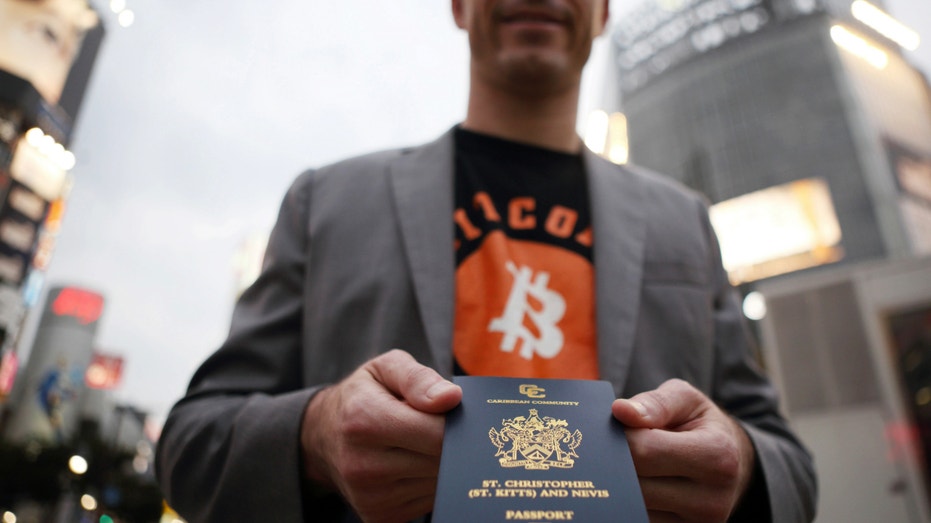When popular bitcoin influencer Roger Ver, known by his 700,000 X followers as “Bitcoin Jesus,” was arrested in February while attending a cryptocurrency conference in Barcelona, the $3 trillion digital asset industry erupted with social media posts and commentary from leading industry voices condemning the act as yet another example of the Biden administration’s “war on crypto.”
Ver’s arrest came after the U.S. Attorney for the Central District of California unsealed an eight-count criminal indictment accusing him of allegedly failing to pay nearly $50 million in taxes on the sale of some $240 million worth of bitcoin in 2017 and under-representing the value of his bitcoin holdings in 2014 when he renounced his citizenship and left the U.S. for the Caribbean nation of Saint Kitts and Nevis.
Lawyers for Ver, 45, an early adopter and promoter of bitcoin who has publicly criticized the U.S. government’s approach to crypto regulation, say the Justice Department’s indictment is purely political and another example of Biden-era officials using enforcement to regulate a space without providing clear rules of the road.
Now Ver and his lawyers are fighting back. His legal team is made up of attorneys from white-shoe law firms Steptoe LLP and Kimura London & White, who on Tuesday filed a motion to dismiss the indictment, citing unconstitutional government overreach and misleading evidence. They are hoping that a crypto-friendly Trump administration will drop the case as part of the president-elect’s promise to end the prior administration’s regulatory assault on the industry.
SEC COMMISSIONER BACKS TRUMP’S PLAN TO END CRYPTO CRACKDOWN

“I always knew I’d be a political target for the IRS and law enforcement after I expatriated,” Ver said in an exclusive statement to FOX Business. “That’s why I made sure to hire the most reputable attorneys and accountants and gave them clear instructions to file everything perfectly — so there’d be no issues when the inevitable audit came. But of course, the IRS still found a way to make it a problem anyhow.”
Ver is an American entrepreneur who briefly ran for California State Assembly in 2000 as a libertarian. His nickname “Bitcoin Jesus” is the result of his early investment in and promotion of the world’s largest digital asset, dating back to 2011 when he would give away free bitcoin as it was trading between $0.31 to $31 per coin. Today, it’s worth close to $100,000 per token.
He was also an early investor in several crypto startups, including Ripple Labs, Blockchain.com, Bitcoin.com (which he founded and served as CEO), and provided the seed money to start BitPay and Kraken. He relocated to Japan in 2006 and eventually became a citizen of Saint Kitts and Nevis when he renounced his U.S. citizenship later in 2014. Earlier this year, he was arrested by Spanish police at the behest of U.S. authorities while on a trip to Barcelona to attend a crypto conference focused on privacy blockchains – specialized blockchain networks designed to enhance user privacy. Around that time, he was also touting the launch of his new book “Hijacking Bitcoin: The Hidden History of BTC,” which, in part, argues how governmental control and regulations have tarnished the cryptocurrency landscape. He’s now out on bail in Spain awaiting possible extradition to the U.S. for a trial date of Feb. 3, 2025.

Ver’s lawyers, and many in the crypto industry, say his public criticism of the U.S. government and his libertarian views could have been part of the motivation for his indictment. If found guilty and convicted, he could face a significant prison sentence.
Ver told FOX Business that the inclusion of his correspondence with attorneys in the filing that provides the rationale for his actions is designed to show the public — and the Trump administration — he was not trying to flout the law, as the government alleges.
TRUMP ADMIN EYES CFTC TO LEAD DIGITAL ASSET REGULATION

In its indictment, the government claims that in 2014, Ver purposely “underreported the fair market values” of his personal bitcoin holdings as well as the holdings he controlled through his two businesses — MemoryDealers US and Agilestar, which were among the first companies to accept bitcoin as a payment method — to avoid paying a higher so-called “exit tax.” Such a tax demands individuals pay a levy on any unrealized capital gains or income made while still a citizen. It also alleges that Ver intentionally failed to report and pay taxes on the capital gains accrued upon closing those businesses in 2017 and cashing out on the bitcoin holdings.
In the motion to dismiss, Ver’s legal team claims that the government violated Ver’s fundamental right to fairness and due process because officials from the Justice Department may have improperly obtained attorney-client-privileged communications that led to his arrest while also withholding select information from a grand jury that may have exonerated him if given in full context. Additionally, they claim that the obligation of the exit tax is unconstitutional, as it ignores constitutional protections for American citizens looking to expatriate. These claims, paired with the argument that U.S. tax guidelines surrounding digital assets at the time were convoluted at best, warrant a dismissal of the indictment, they say.
A representative for the U.S. attorney’s office in central California had no immediate comment.
Ver maintains that he relied on the professional advice of the law firm he retained (referred to as Law Firm 1 in the filing), which was operating in the confines of the limited and opaque guidance available for the nascent digital asset industry at the time. Indeed, the IRS did not issue updated guidance on taxing virtual assets suggesting that they should be treated as property, not currency, and therefore subject to capital gains tax, until after Ver left the U.S. in 2014.
“I want to make sure that my exit tax payments are as clean as possible, with no room to have trouble from the IRS in the future,” Ver said to his lawyer in an email correspondence included in the filing dated April 2013.
Ver’s lawyers argue that his hiring of counsel at the time of his expatriation would help prove he attempted in good faith to comply with the law.
Due to the relatively small market at the time of Ver’s expatriation (bitcoin was trading between $450-$600 a coin), his lawyers believed selling a large quantity of the asset at one time could have caused the price of bitcoin to crash, according to emails between Ver and his lawyers included in the new filing. To handle this, Ver’s advisors suggested getting a third-party appraisal of his holdings that would take into account the low trading volume and illiquidity of the bitcoin market and establish a more reasonable valuation that would not put the market at risk. He followed this advice.
Ver says his lawyers also advised him that he would not owe capital gains taxes upon the sale of his bitcoin assets in 2017 because his U.S. tax obligations had concluded when he left the country and paid his exit tax in 2014.
The request for dismissal being filed against the backdrop of an incoming administration that has signaled it will be much more friendly toward crypto than the outgoing one, has lawyers much more optimistic that Ver’s case may qualify for dismissal.
“The Trump Administration will inherit the severe economic, political and regulatory toll of the Biden Administration’s war on crypto. It will implement a range of rollbacks, pardons, and dismissals necessary to stop the lawfare and selective harassment of defendants for political reasons,” said civil rights attorney Robert Barnes, who has represented the likes of Wesley Snipes, Robert F. Kennedy Jr. and Ralph Nader, and is now an advocate for Ver. “Few actions could send a stronger message in this regard than pardoning Bitcoin Jesus.”
Last month, a prosecutor for the country’s top criminal court, the Southern District of New York, said he believes fewer cryptocurrency lawsuits, outside of fraud and manipulation cases, will be brought under the new administration. Trump has tapped for Manhattan U.S. Attorney his former Securities and Exchange Commission Chairman Jay Clayton, who oversaw more than 50 enforcement actions against the crypto industry during his tenure but has since become an adviser to various crypto outfits, including custody platform Fireblocks and investment firm One River.
Read the full article here















